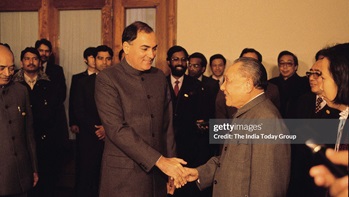
Can third-party States and intelligence agencies influence bilateral negotiations between adversaries? Limited literature exists on the influence of external actors on peace and conflict between India and China in the 1980s. This paper examines four factors that influenced the signing of the 1993 India-China border agreement on maintaining peace and tranquillity: (a) domestic political uncertainties in India and China, (b) the collapse of the Soviet Union, (c) changes in the global balance of power, and (d) the beginning of Indo-US defense partnership and (d) in particular, the role of intelligence agencies of third-party States such as the CIA, KGB, and their interplay with boundary negotiations between India and China. The paper's principal finding is that third-party States can influence bilateral negotiations between adversaries through at least four different ways, viz. military-technology cooperation, selective intelligence sharing, disinformation, or by capitalizing on internal security dilemmas of either of the States. Beyond external actors, the paper highlights the choices made by political leaders and demonstrates the limitations of individuals as agents of history. Historical forces sometimes overtake even the most powerful agents of history, such as leaders in India and China, even when they have the political will to normalize bilateral ties.
© 2019 ICS All rights reserved.
Powered by Matrix Nodes